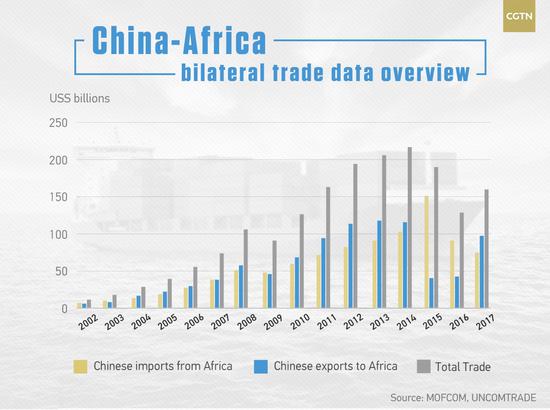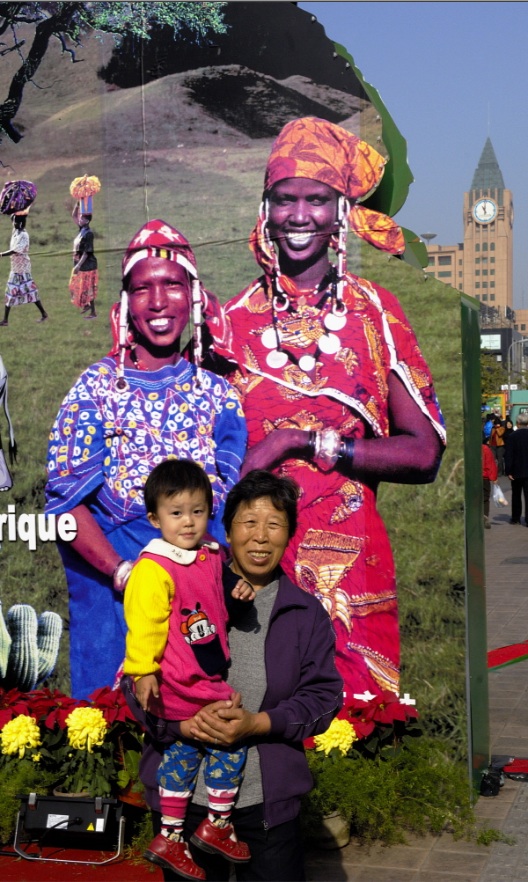Africa, a land rich in resources and diverse cultures, has emerged as a global economic force. To unravel the true extent of its economic prowess, we must delve into the heart of its trade relations. And within this vibrant tapestry of commerce, one name stands tall as the largest trading partner of Africa: China.

Image: www.ecns.cn
The China-Africa partnership transcends mere economic ties; it has transformed into a profound bond that touches every aspect of African society. This extraordinary relationship has its roots in a shared history of mutual respect and cooperation, paving the way for a flourishing economic partnership.
A Historical Embrace: Foundations of a Thriving Alliance
The seeds of the China-Africa partnership were sown centuries ago, when ancient maritime routes connected the two continents. During the 15th century, Chinese explorer Zheng He embarked on epic expeditions to the shores of East Africa, fostering cultural exchange and laying the groundwork for future collaboration.
In the modern era, the partnership took a decisive turn after China’s adoption of its reform and opening-up policy in the late 20th century. This shift toward economic liberalization opened up vast opportunities for trade and investment with Africa, which was eager to diversify its economy and attract foreign investment.
Economic Symbiosis: A Partnership of Mutual Benefit
The China-Africa trade relationship has blossomed into a mutually beneficial partnership that spans a wide range of sectors. African nations export an array of commodities to China, including oil, minerals, agricultural products, and manufactured goods. In return, Africa imports a diverse range of finished goods, machinery, and infrastructure projects from China.
For Africa, China’s insatiable demand for raw materials has spurred economic growth and diversification. It has also attracted significant Chinese investment in infrastructure development, transportation, and manufacturing sectors. This investment has created jobs, boosted productivity, and improved the quality of life for millions of Africans.
On the other hand, China benefits immensely from access to Africa’s vast resources and its growing consumer market. The partnership has helped China secure energy security and raw materials necessary for its continued economic expansion. Moreover, China’s involvement in Africa has provided its firms with lucrative opportunities in infrastructure development and other sectors.
Beyond Commodities: The Rise of High-Value Trade
While commodities still form the backbone of China-Africa trade, there has been a growing trend toward high-value and processed products. African countries are increasingly exporting finished goods, such as textiles, apparels, and electronics, to China. This shift reflects the growing industrialization of Africa and the diversification of its economic base.
Moreover, China has been actively investing in Africa’s manufacturing sector, establishing factories and industrial parks that produce a wide range of goods for both domestic and international markets. This investment is transforming Africa into a major manufacturing hub and creating new export opportunities for African nations.
Social and Cultural Ties: Deepening the Connection
The China-Africa partnership extends beyond economic realms, enriching people-to-people exchanges and cultural understanding. China has become a popular destination for African students, researchers, and professionals, who seek education, training, and opportunities to connect with the Chinese culture and society.
Similarly, Chinese citizens are increasingly venturing into Africa, exploring its diverse landscapes, experiencing its vibrant cultures, and forging lasting bonds with African communities. These cultural exchanges are building bridges of friendship and fostering mutual respect between the two continents.
A Promising Future: A Shared Vision for Prosperity
The future of the China-Africa partnership holds immense promise for both sides. As Africa’s economy continues to grow and diversify, the demand for Chinese goods and investment will undoubtedly increase. At the same time, China’s Belt and Road Initiative is providing a framework for further cooperation and infrastructure development across the continent.
By leveraging their shared vision for prosperity, China and Africa can continue to unlock new opportunities for economic growth, sustainable development, and cultural exchange. The partnership has already transformed the lives of millions of people across Africa, and it has the potential to do so much more in the years to come.
In conclusion, the China-Africa trade relationship is a testament to the power of collaboration and mutual respect. It has brought unprecedented economic benefits to Africa and helped propel China’s rise as a global economic powerhouse. As the partnership continues to evolve, it will undoubtedly play an increasingly vital role in shaping the future of both continents.

Image: www.africa-confidential.com
Who Is Africa’S Largest Trading Partner






